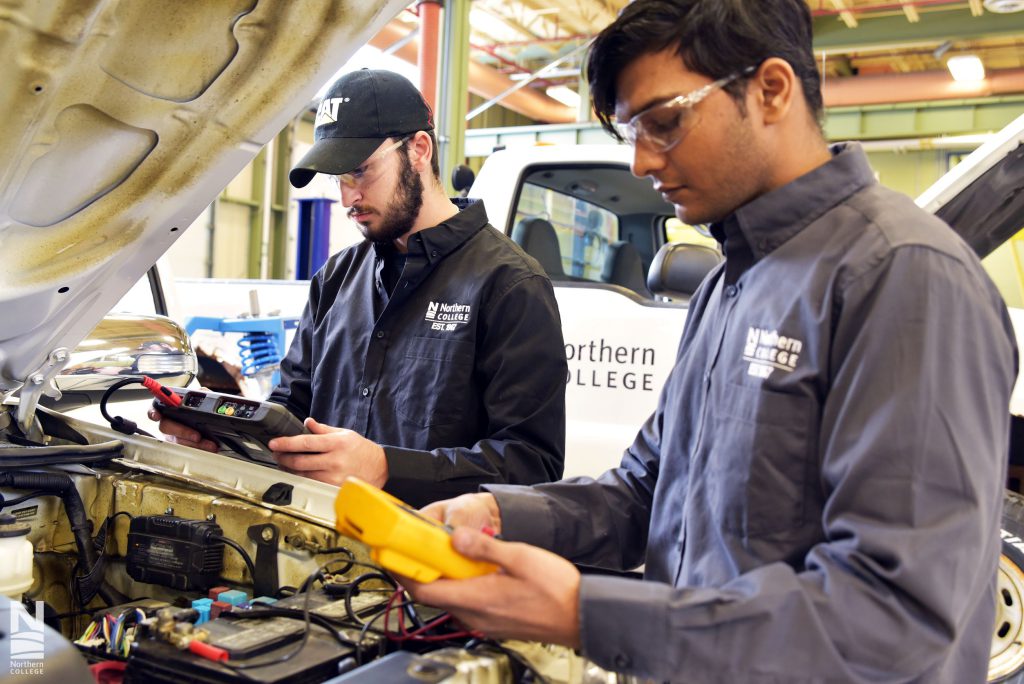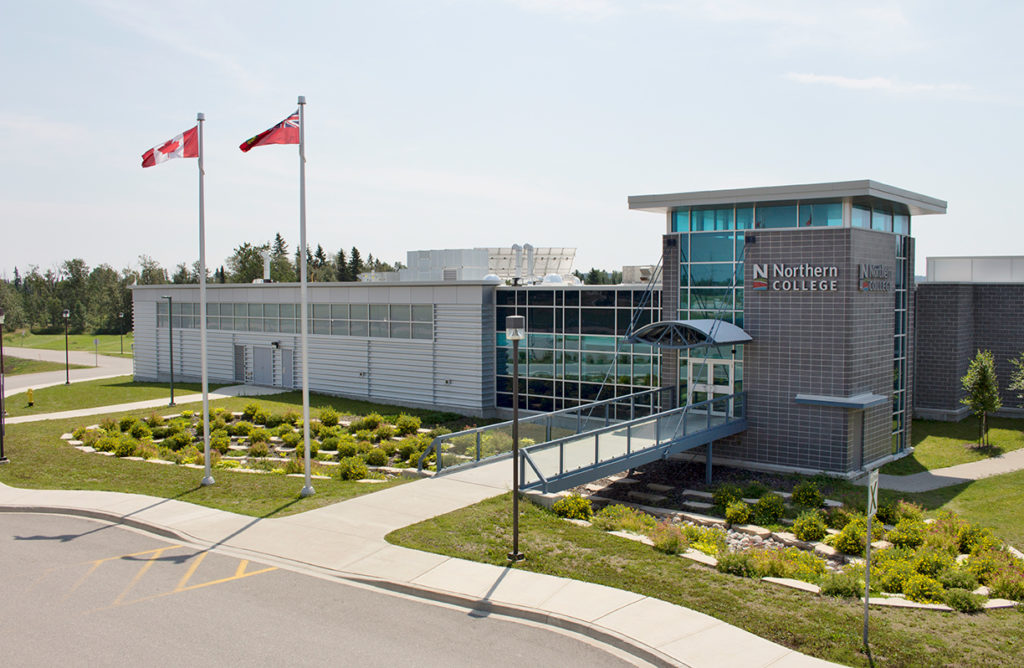Student Success & The Northern Experience
This program will teach you how to analyze and solve automotive system problems, diagnose and repair mechanical, electronic and electrical automotive components and systems while teaching you how to use a variety of troubleshooting techniques and testing equipment to support automotive transportation.
Does this program sound like a good fit for you?
Connect with us to learn more.

Course Information
2024-2025 Academic Year
Semester 1
Students learn the fundamentals of DC electrical and electronic systems, using problem solving techniques and circuit board testing. Topics include basic electrical and electronic theory, problem solving using Ohms’s Law and use of Digital Multimeters.
42 Hours
Communication Fundamentals will provide students with an opportunity to reinforce their use of Standard English, develop their abilities to communicate effectively in the workplace and improve their capabilities with computer technology, particularly in using Word, Excel and ProDemand to produce accurate and professional documents. As well, students will be required to use information technology like Blackboard and their own computing devices to research information online to learn about their trade pathway, find technical information using an industry system like ProDemand, and to complete course assignments.
28 Hours
This course introduces the student to health and safety in their home, in society and within an occupational setting. Students learn about the social and personal benefits of safe work practices and the methods to best prevent accidents or injuries. Students will review the role, right and responsibilities of an individual in today’s health and safety conscious world. Students also learn how to read and interpret the Occupational Act and Regulations.
42 Hours
This course introduces students to careers in the motive power sector. Students will also use various service information systems required to successfully inspect, test and repair motive power vehicles. Students will access online service information to create work orders, research motive power system operations, identify component locations and electrical diagrams, and locate service information to aid in diagnostics and repairs.
28 Hours
Students will learn the basic mathematics and measuring instruments needed in the repair trade for mechanics and will relate the basic math for measuring and problem solving in repair and maintenance.
28 Hours
Topics include shop safety and safe working habits, proper vehicle lifting practices, hand, shop and power tool identification and selection, use of precision tools, learn about fasteners, torque, bearing and seals. The students will put into practice what they have studied in theory class.
56 Hours
The continual introduction of innovative techniques and more complex equipment is resulting in increasing demands for trades people who are not only skilled in the practical aspects of the trade, but who have a sound theoretical knowledge of all procedures associated with the servicing and repairing drive train systems of motor vehicles. The general aims of this course are to provide the theoretical knowledge, and practical instructions to complement the work experience of Auto Service Technician apprentices.
70 Hours
This course is designed to assist beginning students with the basic principles of welding. The emphasis is placed on practical applications and to assist the student in developing more advanced skills.
28 Hours
Semester 2
This course is required in the second semester of the Motive Power Technician – Automotive Service, Heavy Equipment Techniques, Motive Power Technician – Heavy Equipment and Mechanical Technician and Techniques – Industrial Millwright and Mechanical Technician – Welding Fitter trades programs at Northern College. The purpose of this course is to give students an opportunity to develop and enhance basic communication skills as required in the workplace. Students will also be required to use a computer to complete assignments and other course work, work independently and collaboratively, follow instructions and complete assigned tasks on time.
28 Hours
This general education course will provide students with an introduction to Canadian Indigenous Nations’ history, sovereignty, land titles, cultural history and current critical issues. Topics addressed include the content of Indigenous rights, economic and social development, community and political processes, and business law and policies, justice & social services. Canadian Indigenous History and Relations is a general education course that has been incorporated into all programs at Northern College.
42 Hours
This course continues the development of knowledge and skills required to achieve success in the motive power industry. Students will review precision measurement and percent applications, as well as learn about ratios and proportions, geometry, and graphing.
28 Hours
This course is designed to provide students with a fundamental understanding of the operating principles, types, and designs of the modern internal combustion engine. Students will be able to explain how the engine produces torque and identify short block and cylinder head components. Students will have the opportunity to practice the skills learned using special tools and measuring instruments in the practical section of the course.
70 Hours
This course continues the development of knowledge and skills required to maintain and diagnose motive power electrical systems. The subjects of study include the following systems: electromagnetic devices, wiring and wire repairs, advanced circuit diagnosis, electrical schematics, flooded batteries, and starter motors. The students will have the opportunity to identify and describe systems, demonstrate the use of diagnostic tools, and recognize and solve problems using a strategy-based approach.
42 Hours
Students are introduced to different types and classifications of gasoline and diesel engines, the basic operation of the two- and four-stroke cycle engines, the different types of automotive fuels and their properties, intake and exhaust systems used on motor vehicles, electronic fuel injection systems and emission control systems. Students will also be introduced to Hybrid vehicle systems.
56 Hours
Students are introduced to motive power type steering, suspension, and braking systems. The subjects of study include the fundamentals of steering systems and components, tires, wheels, hubs, and hydraulic braking systems. Students will have the opportunity to practice the skills learned in the practical section of the course.
70 Hours
Semester 3
Students are introduced to the basic construction of internal combustion engines, and will learn the proper maintenance, cleaning, inspection and overhaul procedures of gasoline engines and components. Topics will include the construction and repair of valve trains and camshafts, cylinder heads, engine testing and start-up procedures and engine component failure analysis.
70 Hours
This course is designed to provide experience with the diagnosis and repair of steering, suspension and brake systems. Students will learn about component replacement, wheel alignment and hydraulic brake system servicing. Students will also be introduced to electronic systems such as: TPMS, ABS, Traction Control and Electronic Steering and Suspension systems.
56 Hours
In this course, students will be introduced to the tools and strategies required to diagnose motive power electronic circuits, lighting, driver information and power accessory systems. Students will also learn the fundamentals of operation and diagnostic testing procedures for charging systems.
42 Hours
This course is designed to provide the student with the principles of computers and scan tools, and practical experience in the diagnosis and repair of fuel and engine management and emission control systems.
42 Hours
This course is designed to provide the student with practical experience in diagnosis and repair of heating and air conditioning systems.
56 Hours
General Education Courses are selected online each semester by the student from a list provided and exposes students to a related area of study outside of their immediate academic discipline. Certain programs have predetermined electives.
42 Hours
Semester 4
This course introduces students to the nature of business and entrepreneurship. Students will obtain an overview of entrepreneurship and the entrepreneurial process then expand into key concepts including business types, customers, marketing, financials and human resources. The options of franchising and purchasing existing businesses are also covered in this course. Students will outline and assess the components of a Business Plan.
42 Hours
The two-day Motive Power Automotive Placement provides a valuable opportunity for students to experience a workplace setting first hand while providing a realistic and practical method of career education. The placement allows students to practice theoretical knowledge and skills learned in the classroom and Lab and to develop practical job required skills. Placement helps orient the student in their chosen field, and results in a well-developed career plan before graduation.
15 Hours
This course is designed to provide the student with theoretical knowledge and practical experience in diagnosis and repair of torque converters and automatic transmissions and transaxles. This course will be presented through lectures, class discussions, assignments, individual instruction, and handout material.
70 Hours
Students will learn about ignition systems, vehicle communication systems, supplemental restraint systems and anti-theft systems found on today’s motor vehicles. Additionally, the students will have the ability to explain the principles of operation and diagnosis of fuel, electrical drive and regenerative braking systems associated with hybrid vehicles.
42 Hours
General Education Courses are selected online each semester by the student from a list provided and exposes students to a related area of study outside of their immediate academic discipline. Certain programs have predetermined electives.
42 Hours
Career Ready Graduates
Articulation Agreements
A number of articulation agreements have been negotiated with universities and other institutions across Canada, North America and internationally. These agreements are assessed, revised and updated on a regular basis. Please contact the program coordinator for specific details if you are interested in pursuing such an option.
Career Opportunities
Graduates of this program may find employment in the motor vehicle industry as a trainee or as an apprentice mechanic. Graduates may also work as a technical service advisor, service manager, parts/salesperson, or an insurance adjuster.
Automotive Service Technicians are employed by motor vehicle dealers, garages, truck and trailer dealerships, fleet maintenance companies, service stations, automotive specialty shops, and retail establishments with automotive service shops.
- Analyze, diagnose, and solve various motive power system problems by using problem-solving and critical thinking skills and strategies and by applying fundamental knowledge of motor vehicle operation, components, and their interrelationships.
- Diagnose and repair climate control systems in compliance with manufacturers’ recommendations.
- Diagnose and repair engine systems in compliance with manufacturers’ recommendations.
- Diagnose and repair electrical, electronic, personal safety, and emission components and systems in compliance with manufacturers’ recommendations.
- Diagnose and repair drive train components and systems in compliance with manufacturers’ recommendations.
- Diagnose and repair suspension, steering, and brake components and systems in compliance with manufacturers’ recommendations.
- Disassemble and assemble components to required specifications by applying workshop skills and knowledge of basic shop practices.
- Select and use a variety of troubleshooting techniques and test equipment to assess electronic circuits, vehicle systems, and subsystems.
- Apply knowledge of hydraulics and pneumatics to the testing and analysis of motive power systems and subsystems.
- Communicate information effectively, credibly, and accurately by producing supporting documentation to appropriate standards.
- Use information technology and computer skills to support work in a motive power environment.
- Prepare, support, maintain, and communicate data from log, record, and documentation systems.
- Apply business practices, project management skills, and communication skills to improve customer service.
- Assist in quality-control and quality-assurance programs and procedures.
- Develop and use personal and professional strategies and plans to improve professional growth, job performance, and work relationships.
- Complete all assigned work in compliance with occupational, health, safety, and environmental law; established policies and procedures; codes and regulations; and in accordance with ethical principles.
Admissions Information & Requirements
Admission Requirements
- Ontario Secondary School Diploma (OSSD)
- Grade 12 English (C, U)
- Grade 11 Math (C, M, U)
Or equivalent
Academic prerequisites for this program may be obtained free of charge through Academic Upgrading.
Applicants who do not have a high school diploma or equivalent and will have reached the age of 19 years on or before the start of the program must undergo academic testing and may be required to complete Prior Learning Assessment & Recognition (PLAR) process to demonstrate equivalency of admission requirements prior to admission into a program.
For more details, please contact the Admissions Office at 705-235-7222 or admissions@northern.on.ca.
Additional Requirements for International Students
In addition to the admission requirements, international students must have proof of English Proficiency and meet the requirements below.
1. Proof of Senior High School Diploma/Certificate
2. English Proficiency (we will require one of the following):
- IELTS Academic International English Language Testing System: a minimum overall score of 6.0 must be achieved with no individual band score under 6.0; however, we will accept one band at 5.5.
- TOEFL (Test of English as a Foreign Language) – Internet Based Test (iBT) overall minimum score of 79
- PTE (Pearson Test of English) Academic – Graduate Diploma: 58+
3. CO-OP Work Permit is mandatory for this program to participate in unpaid program placements.
If your country of citizenship has English as its official language, we may accept alternate proof of English Proficiency.
All educational documents must be submitted in English and will be dependent on the country of citizenship.
For more information, please contact admissions@northern.on.ca.
Tuition, Fees & Payments
| Student | Year | Campus | Program Code | Tuition | Ancillary Fees | Total Fees |
|---|---|---|---|---|---|---|
| StudentDomestic | Year1 | CampusTimmins - PC | Program CodeT110 | Tuition$2,720.56 | Ancillary Fees$949.50 | Total$3,670.06 |
| StudentDomestic | Year2 | CampusTimmins - PC | Program CodeT110 | Tuition$2,750.56 | Ancillary Fees$861.50 | Total$3,612.06 |
| StudentInternational | Year1 | CampusTimmins - PC | Program CodeT110 | Tuition$14,382.00 | Ancillary Fees$1,472.58 | Total$15,854.58 |
| StudentInternational | Year2 | CampusTimmins - PC | Program CodeT110 | Tuition$14,382.00 | Ancillary Fees$1,384.58 | Total$15,766.58 |
Find Your True North.
At Northern College, you’re a part of a community.
From your teachers to support staff and administrators, we are all here to help you get an education and make some lasting connections along the way.
Your success is incredibly important to you, so we provide student supports to help you achieve your goals. From study assistance and accessibility services to mental health supports and financial aid, we’ve got you covered.
Each of Northern’s campuses boasts exercise facilities, a gym, cafeteria, study areas and a library – places that you can go to help keep you focused as you work your way through your studies. The communities we call home are incredible places, filled with amazing people and things to do.


Does Northern College sound like a good fit for you?
Here’s how to take your first steps on your new exciting and rewarding career path.
